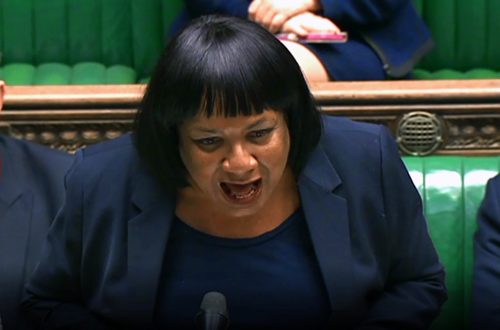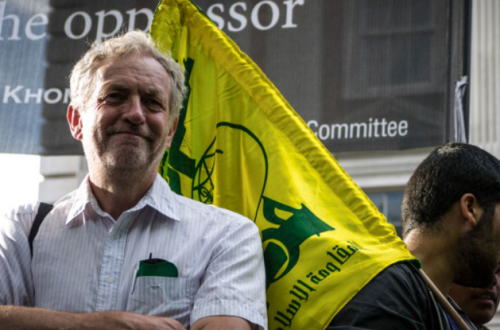So, it is almost that Global Peace and Unity time of year again.
Regular readers of Harry’s Place will remember that, every year, the Islam Channel invites some of the most extreme and nasty Islamists – supporters of attacks on our troops, of terrorism (outside the UK, of course), Holocaust denial, wife beating, and so on – to bunfight. Each year, leading politicians from all three parties are invited. Sometimes, they attend.
Labour’s performance on this matter has ranged from excellent to terrible.
The Lib Dems have been atrocious – not only did they attend the event, they rubbished Policy Exchange’s attempt to brief leading politicians on the nature of the invitees to the conference.
The Tories’ Dominic Grieve did turn up, and very impressively expressed his disappointment at the nasty views espoused by some of the attendees. If you are going to attend, that is the way to do it.
So, what will happen in 2010?
Former Tory cohesion minister, Paul Goodman has the low down – via the Benkhaldun blog – on some of the attendees.
Speakers apparently include –
- Hussain Yee (as Gilligan said), who believes that Muslims didn’t carry out 9/11 and has supported attacks on British troops in Iraq.
- Yusuf Estes, who’s said that disobedient wives should be hit with rolled-up newspapers or yardsticks.
- Rabbi Yisroel David Weiss, attender of the holocaust denial conference in Iran – the “goons’ rodeo”, as Martin Amis described it – and buddy of Mahmoud Ahmadinejad, the Iranian election fraudster.
- And possibly Dr Abu Rahman Al-Sudais, who has supported attacks on our troops in Iraq, and described Christians as “cross worshippers”, Jews as “rats of the world”, and Hindus as “idol worshippers”.
Oh, and finally…Yasir Qadhi, one of the two men specifically singled out as objectionable by Grieve.
This is Paul Goodman’s advice:
Theresa May’s made a good start at the Home Office by barring Zakir Naik and Bilal Phillips from entering the UK. The final list of speakers for GPU has yet to be published. Part of the annual gavotte is backstairs negotiation between the organisers and politicians. Ministers don’t have to make up their minds at this stage whether or not to attend.
Furthermore, politicians must necessarily meet all sorts of people. At times, they can’t be too particular, and it’s neither practicable not desirable for them to quiz all of those they meet in detail. But they shouldn’t lend legitimacy to people who support attacks on our troops, on civilians as a matter of principle, or incite hatred and violence – and who, furthermore, don’t represent the mass of British Muslims for whom they purport to organise. If such people are on the platform, Ministers shouldn’t go to the GPU this year.
Paul Goodman links to a related story in today’s Sunday Telegraph by Andrew Gilligan. He reports that civil servants in the Communities Department are working hard to push ministers into attending the GPU Event:
The Communities Department also appears to be attempting to facilitate the attendance of ministers at a controversial event closely associated with Islamic extremism.
The Global Peace and Unity conference in London this October is organised by the Islam Channel, a TV station which has a number of fundamentalist and extremist presenters. Speakers at the conference are a mixture of mainstream figures and Islamic militants, including Hussain Yee, a preacher who has been accused of anti-Semitism and who the Home Office is reportedly seeking to bar from Britain.
In an email exchange this month with the conference organiser, a Communities Department official, Ingrid Barnes, asks: “I was just wondering whether you have sent invitation letters to Ministers yet? Ministers go on summer recess at the end of July, so it would be good to put something up to them before then.”
Rashad Ali, of the Centri counter-extremism thinktank, said: “Government policy in this area appears to be in flux with both positive steps taken and also issues of concern. The next few months will be decisive.”
Paul Goodman, the former Tory communities spokesman, said: “It’s clear that Home Office ministers recognise that non-violent extremism can be the soil from which violent extremism grows and are determined to make Government policy reflect this view. They are entitled to expect the civil service to respect these views.”
A joint statement from the Communities Department and the Home Office said: “The new government is committed to overhauling the flawed ineffective and counter productive prevent programme and will take firm action to tackle domestic extremism in all its forms.”
The report is based on a leak of classified papers, which indicate that the Communities Department has a certain, erm, problem. Here’s what they’ve been advising:
In the classified papers, presented last week to Coalition ministers on the Cabinet’s home affairs committee, officials say a “clear assessment” has been made that individuals “do not progress” to violence through such groups.
One paper, classified “Restricted” and entitled “Government strategy towards extremism”, says: “It is sometimes argued that violent extremists have progressed to terrorism by way of a passing commitment to non-violent Islamist extremism, for example of a kind associated with al-Muhajiroun or Hizb ut Tahrir … We do not believe that it is accurate to regard radicalisation in this country as a linear ‘conveyor belt’ moving from grievance, through radicalisation, to violence … This thesis seems to both misread the radicalisation process and to give undue weight to ideological factors.”
In fact, at least 19 terrorists convicted in Britain have had links with al-Muhajiroun, including Omar Khayam, sentenced to life imprisonment as leader of the “fertiliser bomb” plot, and Abdullah Ahmed Ali, the ringleader of the airliner “liquid bomb” plot, who is also serving life.
Oh, but which civil servant could possibly be behind this duff advice? Lemme guess….
The papers are understood to have been prepared with the involvement of Mohammed Abdul Aziz, a controversial paid ministerial adviser to the Communities Department. Mr Aziz is an honorary trustee of the hardline East London Mosque, which has hosted dozens of hate and extremist preachers, including Anwar al-Awlaki, a cleric cited as an inspiration by the perpetrators of 9/11 and many other terrorist attacks.
The mosque is the headquarters of, and closely linked to, a secretive, fundamentalist network, the Islamic Forum of Europe – which believes in transforming “the very infrastructure of society, its institutions, its culture, its political order and its creed … from ignorance to Islam”. Mr Aziz is a former officer of the IFE’s youth wing.
Earlier this year the IFE was accused by Jim Fitzpatrick, then a Labour minister, of infiltrating and “corrupting” his party in the same way as the Militant Tendency in the 1980s.
The papers appear to pave the way for a policy recommended by Mr Aziz in another document leaked to this newspaper. Written in April, it condemns what Mr Aziz calls the previous Government’s “veto approach” towards fundamentalist-influenced organisations.
Mr Aziz says that ministers and officials in the new administration should consider appearing in public, “on a case by case basis”, even with organisations which promote “a message of divisiveness, expressing intolerance towards other communities in the UK”.
He says that Whitehall officials should even deal privately with organisations which may support “violent extremism in Britain”, and urges that organisations should only be boycotted as a “port of last call” in “very defined circumstances” including “wholly unacceptable positions on the use of force”.
Mr Aziz also strongly recommends far closer engagement with hardline, but non-violent, organisations such as the IFE and the East London Mosque.
It gets worse!
But in a “restricted” memorandum to Eric Pickles, the Communities Secretary, written on July 15, Robert Mason, one of his senior officials, says the papers present “a clear assessment that individuals do not progress through non-violent extremist groups to violent groups … Extreme groups may also provide a legal ‘safety valve’ for extreme views.”
Bear in mind, while reading this, that ‘non violent” in this context generally means only that they do not support terrorism in the United Kingdom. They do, more often than not, support a notion of ‘defensive jihad’: a religious political theory that legitimates violence to defend and establish Islamist and Muslim states. Of course, that almost always includes support of Hamas.
God help us if Pickles takes this advice. What do you reckon? Does he have the guts to tell the pro-IFE clique to bug off?
He should. This is why.
Let us immediately discount the very remote possibility that the Communities Department has been infiltrated by supporters of the politics of Jamaat-e-Islami who are making these recommendations for ideological reasons. Instead, let us engage with the argument – promoted by Bob Lambert – that partnerships with “non-violent Islamists” are an essential bulwark against ‘violent Islamists”.
The problem with that thesis is Anwar Al Awlaki: a man who was relentlessly promoted by a pretty full range of “non-violent Islamist” organisations, including those with links to Islamic Forum Europe and the East London Mosque. Awlaki was promoted as a moderate, but turned out to be closely associated with Al Qaeda. In other words, the best you can say of the affair is that “non violent Islamists” are no good at spotting “violent Islamists”, let alone preventing them. Indeed, CagePrisoners actually engaged in advocacy on Awlaki’s behalf, prior to his open declaration of his links with terrorists, and after the publication of his pamphlet “44 Ways to Support Jihad”.
In other words, the strategy being recommended to Eric Pickles has been proved to have failed, and dangerously so.
Eric Pickles should be given a copy of the following recently published article by Alexander Meleagrou-Hitchens and Jacob Amis in the journal, Current Trends in Islamist Ideology vol. 10:
The careers of Awlaki and Abdulmutallab powerfully suggest the fluidity of Islamist thought. In particular, they illustrate the confluence between what might be broadly termed “hard” and “soft” Islamism. The latter is based on long-term and largely non-violent social and political activism, while the former looks to immediate violence to further its goals.[1] Awlaki and Abulmutallab, however, moved rapidly and seamlessly within and between these different modes of Islamism, and it would seem that extreme beliefs common to both provided a launching pad for increasingly extreme actions. It is argued here that an intensely literalist yet politically impassive Salafism made Abdulmutallab nevertheless receptive to the activist Islamism of the UCL Islamic Society. Later, he made a further jump to jihadism
…
The careers of Abdulmutallab and Anwar al-Awlaki remind us that individuals can slip beyond this porous boundary rapidly and very often unnoticed. That any particular strand of Islamist ideology can effectively block the shift to violence is at best uncertain. Rather, the evidence presented here suggests that religiously meritorious violence, once accepted under any circumstances, can take on a momentum of its own. Further, the shared principles of diverse forms of political Islam can, however innocently, provide an ideological firewall that obscures and underwrites the violent intentions of the minority.
The authors go on to analyse the development of Awlaki’s theology and politics, and his many links to the Muslim Brotherhood and Jamaat-e-Islami networks in the United Kingdom. It is a long piece, but one well worth 30 minutes of your time.
Recommend it to your MP.


